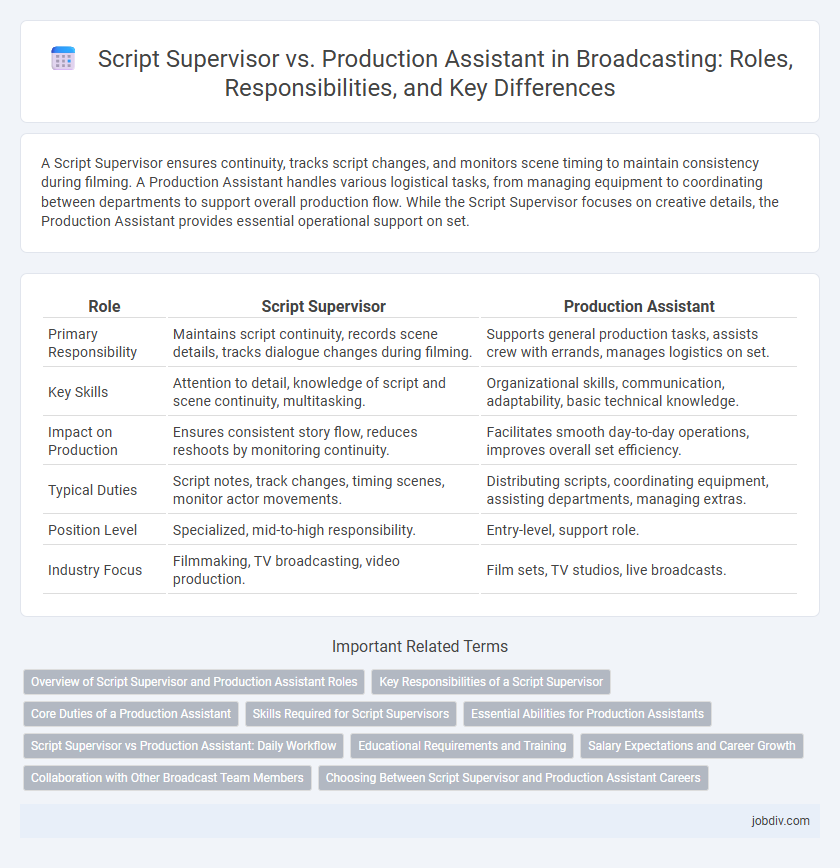A Script Supervisor ensures continuity, tracks script changes, and monitors scene timing to maintain consistency during filming. A Production Assistant handles various logistical tasks, from managing equipment to coordinating between departments to support overall production flow. While the Script Supervisor focuses on creative details, the Production Assistant provides essential operational support on set.
Table of Comparison
| Role | Script Supervisor | Production Assistant |
|---|---|---|
| Primary Responsibility | Maintains script continuity, records scene details, tracks dialogue changes during filming. | Supports general production tasks, assists crew with errands, manages logistics on set. |
| Key Skills | Attention to detail, knowledge of script and scene continuity, multitasking. | Organizational skills, communication, adaptability, basic technical knowledge. |
| Impact on Production | Ensures consistent story flow, reduces reshoots by monitoring continuity. | Facilitates smooth day-to-day operations, improves overall set efficiency. |
| Typical Duties | Script notes, track changes, timing scenes, monitor actor movements. | Distributing scripts, coordinating equipment, assisting departments, managing extras. |
| Position Level | Specialized, mid-to-high responsibility. | Entry-level, support role. |
| Industry Focus | Filmmaking, TV broadcasting, video production. | Film sets, TV studios, live broadcasts. |
Overview of Script Supervisor and Production Assistant Roles
A Script Supervisor oversees continuity, ensuring scenes align perfectly with the script, tracking details like dialogue, props, and camera angles throughout filming. Production Assistants support various departments by managing logistical tasks, coordinating schedules, and facilitating communication on set. Both roles are essential for smooth production, with the Script Supervisor focusing on narrative accuracy and the Production Assistant on operational efficiency.
Key Responsibilities of a Script Supervisor
A Script Supervisor in broadcasting is responsible for maintaining script continuity, tracking scene details, and ensuring the director's vision aligns with the written script. They meticulously note discrepancies, dialogue changes, and actor movements to prevent inconsistencies during editing. Unlike Production Assistants who handle general logistical tasks, Script Supervisors focus specifically on script accuracy and scene coordination throughout production.
Core Duties of a Production Assistant
A Production Assistant in broadcasting is responsible for supporting the production team by managing logistics, coordinating schedules, and facilitating communication among departments. Core duties include organizing equipment, handling paperwork, and assisting with on-set operations to ensure smooth workflow. Unlike a Script Supervisor who focuses on script continuity and tracking dialogue, the Production Assistant's role is broader, emphasizing operational support and problem-solving on set.
Skills Required for Script Supervisors
Script Supervisors require acute attention to detail, proficiency in continuity tracking, and strong communication skills to coordinate between directors and production teams. Expertise in notation systems, timecode synchronization, and scene breakdowns ensures accurate script adherence during filming. Mastery of software tools like Final Draft and Movie Magic Scheduling enhances their ability to maintain seamless production flow.
Essential Abilities for Production Assistants
Production Assistants must excel in multitasking, communication, and quick problem-solving to support the production's daily operations efficiently. Key abilities include managing schedules, coordinating logistics, and facilitating clear communication between departments to ensure smooth workflow on set. Proficiency in organizational tools and adaptability in fast-paced environments distinguishes effective Production Assistants from other roles.
Script Supervisor vs Production Assistant: Daily Workflow
Script Supervisors meticulously track continuity, manage script notes, and coordinate dialogue changes throughout each shooting day to ensure accuracy and consistency. Production Assistants handle logistic support, such as managing equipment, facilitating communication among departments, and assisting with on-set operations. While Script Supervisors focus on narrative precision and shot details, Production Assistants support the overall production flow by addressing immediate practical needs.
Educational Requirements and Training
Script Supervisors typically require formal training in film studies, script analysis, or production management, often holding a degree or certification in these areas to master continuity and detailed script tracking. Production Assistants usually enter the field with a high school diploma or basic post-secondary education, relying heavily on on-the-job training to develop skills in set operations and general production support. Specialized workshops or short courses in film production can benefit both roles by enhancing their understanding of industry standards and technical workflows.
Salary Expectations and Career Growth
Script Supervisors typically earn higher salaries than Production Assistants, with average annual wages ranging from $50,000 to $70,000 compared to $30,000 to $45,000 for Production Assistants. Career growth for Script Supervisors often leads to roles such as Assistant Director or Post-Production Coordinator, leveraging their detailed knowledge of script continuity and scene management. Production Assistants usually advance to specialized crew positions, but face slower salary increases due to the entry-level nature of the role and broader industry competition.
Collaboration with Other Broadcast Team Members
Script Supervisors ensure continuity and accuracy by closely collaborating with directors, editors, and camera operators, providing detailed notes that facilitate seamless scene transitions. Production Assistants support various departments by coordinating logistics and communicating real-time updates, enhancing the efficiency of on-set operations. Both roles are crucial for synchronizing efforts among broadcast team members to maintain a smooth production workflow.
Choosing Between Script Supervisor and Production Assistant Careers
Script Supervisors ensure continuity and accuracy in film and television productions by meticulously tracking scenes, dialogue, and shots, making them essential for post-production and editing processes. Production Assistants handle various on-set tasks such as coordinating equipment, managing schedules, and assisting departments, offering a broad exposure to the production environment and valuable industry networking opportunities. Choosing between careers depends on your interest in detailed script management and storytelling precision versus versatile, hands-on production support.
Script Supervisor vs Production Assistant Infographic

 jobdiv.com
jobdiv.com